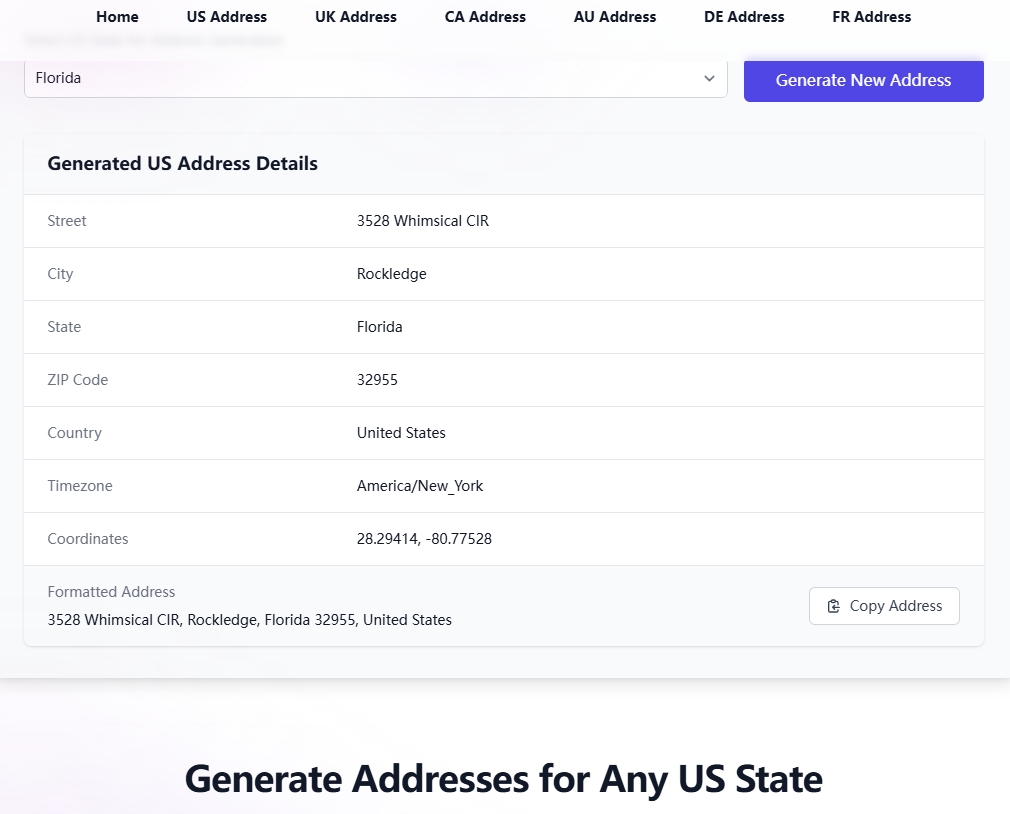In the world of IT services and software development, accuracy and reliability are paramount. Testing software applications often requires vast amounts of data, particularly when simulating real-world scenarios. This is where tools like random address generators come into play. Whether you’re working on a web application, testing a user database, or building a geo-location feature, a random address generator can be an essential tool. But what makes it so important in the development and testing lifecycle?
What is a Random Address Generator?
At its core, a random address generator is a tool that generates fictitious but realistic-sounding addresses. These can include a variety of address components such as street names, cities, postal codes, and even countries. The generator can often be tailored to produce addresses specific to particular regions or countries, making it a versatile tool for developers across different industries.

The key to a random address generator is that it does not use real addresses but instead creates data that mimics the structure of an address. This ensures privacy while still providing relevant test data.
The Role of Random Address Generators in IT Services
- Ensuring Data Integrity in TestingWhen developing software applications, ensuring data integrity is crucial. Whether you’re creating an online store, a social media platform, or a location-based service, it’s important that your application can handle addresses as part of the user’s profile or shipping information. However, using real customer data during the development or testing phase is not only inefficient but also raises privacy concerns. A random address generator can simulate realistic addresses, allowing developers to test the system without exposing sensitive data.For instance, when testing how an e-commerce website processes shipping addresses, developers can use generated random addresses to verify if the system correctly formats and validates data fields like zip codes, country names, and street numbers. This ensures that when real customers interact with the platform, their data will be handled securely and accurately.
- Enhancing User Experience TestingUser experience (UX) testing involves understanding how users interact with your application, and ensuring that they can perform tasks seamlessly. For applications that require address input—such as food delivery apps, online shopping, or location-based services—it’s essential to ensure the user interface accommodates all possible address formats. By using a random address generator, testing teams can quickly generate diverse address data that spans multiple regions, helping to ensure the UI is responsive and robust across various global formats.

- Simulating Real-World Data for Performance TestingPerformance testing involves evaluating how well an application performs under load. Random address data can be an excellent tool for this purpose, particularly when dealing with systems that must handle large datasets. By simulating thousands of random addresses, developers can test how well their database and back-end systems can handle extensive address information without compromising performance.For example, if you’re building a global delivery tracking system, you might want to simulate thousands of customers from around the world, each with a unique address. The random address generator can help populate the test system with this large dataset, which is critical for testing scalability and ensuring that the system can efficiently manage large volumes of user data.
- Geolocation and Mapping ServicesGeolocation-based applications often rely on accurate address data to provide users with features such as map routing, location tracking, or local recommendations. To ensure that these features work correctly across a range of different locations, developers often need to test how the system processes and displays addresses. A random address generator is invaluable in this context, as it allows testers to quickly generate a variety of addresses from different regions.For example, if you’re working on a ride-sharing app, you might want to test how the app assigns a ride to a randomly generated address in a specific city or country. By using a random address generator, you can quickly generate a range of test addresses to ensure the app responds appropriately, regardless of the address format or location.

- Compliance and Privacy ConcernsPrivacy regulations like GDPR and CCPA make it essential for companies to protect personal information during the software development and testing phases. Using real user addresses in a test environment could potentially violate these regulations. By using a random address generator, developers can avoid these risks while still obtaining the necessary test data to ensure their application functions as expected.This approach also mitigates the risk of data breaches during the development phase, as no real user data is involved. Furthermore, many address generators allow customization, meaning they can create addresses that meet the requirements of specific countries or regions, ensuring compliance with regional regulations.

Benefits of Using a Random Address Generator
- Cost-EfficiencyTesting with real data often requires the purchase or collection of large datasets, which can be time-consuming and expensive. A random address generator provides a cost-effective alternative by creating large volumes of realistic address data in a matter of seconds. This significantly reduces the costs associated with data collection, making it an efficient choice for developers working on tight budgets or strict timelines.
- Scalability and FlexibilityOne of the key benefits of a random address generator is its scalability. Whether you need to generate a handful of addresses for a small test or hundreds of thousands for a large-scale performance test, the generator can easily meet your needs. This flexibility makes it an ideal tool for a variety of testing scenarios, from small, isolated feature tests to large-scale, system-wide stress testing.
- Improved Data CoverageA random address generator can produce addresses from different countries, states, and cities, giving developers a diverse range of data to test. This variety ensures that applications can handle address formats from different regions without errors. It also allows for the testing of internationalization features, ensuring that your application supports multiple languages and address formats.
- Reduced Risk of Data Privacy ViolationsWhen testing software, especially applications that deal with sensitive customer data, using real-world addresses poses a privacy risk. A random address generator eliminates this risk by creating fictitious addresses, allowing testing to proceed without compromising data security.

Real-World Examples of Random Address Generators in Action
- E-commerce PlatformsOnline retailers use random address generators to test the shipping and checkout processes. By generating random addresses, they can test whether the website correctly calculates shipping costs, taxes, and delivery times for customers in different regions.

- Delivery ServicesDelivery services such as food delivery apps or parcel delivery companies use random address generators to simulate user orders across various regions. This allows them to test the accuracy of their route optimization algorithms and ensure timely delivery to different locations.
- Subscription ServicesSubscription-based services, such as magazines or monthly product boxes, can use a random address generator to verify that their subscription management systems handle address data properly. This ensures that subscribers in different regions receive their products on time and without errors.
Conclusion
Random address generators are an essential tool in the IT services and software development ecosystem. They provide a cost-effective, efficient, and privacy-conscious method for generating realistic test data, helping developers ensure their applications perform well under diverse conditions. Whether you’re testing a global e-commerce platform, a location-based service, or a geolocation feature, the use of a random address generator can help streamline the testing process, improve data coverage, and mitigate privacy risks.

For those seeking a reliable and customizable random address generator offers a comprehensive tool designed to meet a variety of testing needs. Whether you need addresses for a single country or global data coverage, this platform provides an easy solution for generating random addresses that mirror real-world address formats.
